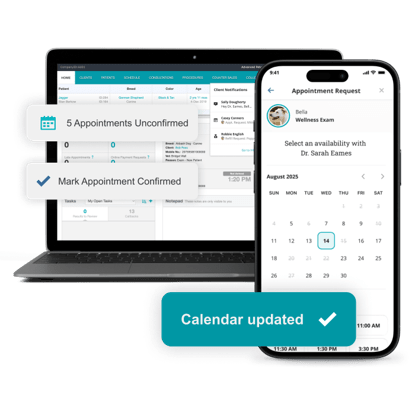How AI For Veterinary Clinics is Changing the Future of Client Communication

Much of the buzz around artificial intelligence (AI) centers on diagnostic tools and record-keeping innovations, but another impactful use of AI is in improving client communication.
Maintaining strong client relationships while juggling time-consuming administrative tasks can be challenging in veterinary medicine. From appointment scheduling to medical record-keeping, daily responsibilities can overwhelm veterinary teams and limit the amount of face time veterinarians have with clients. However, AI for veterinary clinics is changing that dynamic.
Chatbots and virtual assistants
AI technology improves veterinary professionals’ communication capabilities via automation and round-the-clock availability. For example, virtual assistants and chatbots on the practice website can answer basic questions or assist with scheduling anytime, providing pet owners with a 24/7 resource that isn’t Dr. Google. Real-time responses like this give clients peace of mind while reducing the workload on front desk staff.
Implementing chatbots and virtual assistants doesn’t mean clients lose the human communication element entirely. Instead, it helps filter routine requests and direct more in-depth inquiries to the appropriate team members so nothing falls through the cracks.
Additional AI-powered tools integrated with your practice management software can automate appointment reminders and follow-up messages, providing custom educational content related to a treatment plan or condition. More advanced future systems may use machine learning algorithms to personalize these messages based on previous visits, diagnoses, or pet owner preferences.
Telemedicine
The rise of telemedicine in vet med has allowed unprecedented communication and access to veterinary care while creating new opportunities for AI technology to shine. AI-powered triage tools can help veterinary professionals take histories and assess the urgency of a pet’s symptoms before a virtual consultation or in conjunction with asynchronous telemedicine communications (e.g., email, text message). Quickly combining client input, the pet’s past medical records, and current pet health issues helps the team provide more efficient patient care and timely advice.
Incorporating AI for veterinary clinics into telemedicine workflows also helps streamline documentation and communication. Applications that provide AI scribing and telehealth can take real-time notes during virtual visits and help vets concentrate on the client and pet rather than trying to remember everything they say. Choosing a platform that integrates with your cloud-based practice management software can make these interactions even smoother.
Record-keeping and administrative efficiency
Administrative tasks, such as charting, documenting calls, and scheduling appointments, can bog down veterinary clinics. However, accurate records and calendars are crucial for maintaining healthy client relationships. Communication and continuity of care fail when records go unfinished for weeks or months, or teams are too busy to fill prescriptions, respond to questions, or promptly return emails.
Many AI-assisted systems that integrate with your PIMS can automate much of the tedious work veterinary professionals handle daily. AI scribes can listen in on client consultations and create SOAP notes in the patient chart, inventory programs can learn your ordering patterns and predict needs, and communication platforms can allow clients to e-sign forms or make payments from home. Spending less time on the phone or computer means veterinary teams can focus on client and patient needs.
Reducing burnout with AI systems
Veterinary medicine has long dealt with mental health and well-being challenges, often the result of long hours, financial strain, and the physical and emotional burdens that come with caregiving. Team members suffering from burnout, compassion fatigue, or other mental health difficulties may not have the bandwidth to handle intensive client communication.
AI for veterinary clinics can help alleviate everyday stressors affecting veterinary professionals, resulting in better job satisfaction and empowering them to provide a better veterinary client experience. With thoughtful implementation, veterinary teams can use AI tools to increase client access to the team’s knowledge, expertise, and professional pet healthcare.
Getting the most out of AI for veterinary clinics
AI-powered solutions represent significant advancements in the veterinary industry that can help teams meet the rising expectations of today’s pet owners while supporting career longevity and hospital success. Using AI can help improve veterinary client communication and create lasting client relationships.
To get the full AI experience, consider switching to cloud-based, modern practice management software that lets your favorite apps integrate directly into your dashboard and allows for future innovations. AI for veterinary clinics is here to stay, and we’re excited to see what the future will bring.
Want more content like this?



